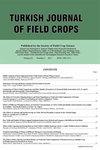PGPR对冬小麦产量及部分产量成分影响的研究
IF 0.8
4区 农林科学
Q3 AGRONOMY
引用次数: 4
摘要
植物促进根际细菌(PGPR)的生长在农业中得到了广泛的重视,PGPR活跃于植物根部和根际并支持植物生长。本研究旨在从小麦土壤中获得和鉴定PGPR分离株,并测定其对植物生长和产量的能力。因此,从土壤中获得了PGPR分离株,通过生化测试和MALDI-TOF MS将其鉴定为芽孢杆菌属(B.simplex和B.pumilus)。小麦种子(Flamura-85)经过PGPR处理后,于2016-2018年在Tekirdag Namık Kemal大学作物系区域进行了接种和未接种种子的田间试验。实验采用分块设计,每个处理有三个重复。在试验中,对株高(PH)、穗长(SL)、穗粒数(NGPS)、穗重(GWPS)和产量(GY)等参数进行了评价和比较。研究表明,PGPR处理有利于植株生长,可显著提高产量9.6%-29.29%,其中W3和W4菌株(B.simplex)对产量有显著影响。根据研究结果,我们可以提到,使用PGPR促进了小麦的生长,并提高了小麦的产量。PGPR的使用可以为可持续和环保的农业实践带来有希望的结果。本文章由计算机程序翻译,如有差异,请以英文原文为准。
INVESTIGATION OF THE EFFECT OF PGPR ON YIELD AND SOME YIELD COMPONENTS IN WINTER WHEAT
The growth of plants promoting rhizobacteria (PGPR) that live actively in plant roots and rhizosphere and support plant growth has gained widespread importance in agriculture. This study was carried out to obtain and identify PGPR isolates from wheat soil and determine their ability and capacity on plant growth and yield. So, PGPR isolates were obtained from soil, and they were identified as Bacillus sp. (B. simplex and B. pumilus) by biochemical tests and MALDI-TOF MS. After the wheat seeds (Flamura-85) were treated PGPR, the field experiment was conducted with inoculated and non-inoculated seeds at the area of the Field Crops Department, Tekirdag Namık Kemal University in 2016-2018. The experiment was arranged in a split-plot design with three replicates for each treatment. In the experiment, some parameters such as plant height (PH), spike length (SL), number of grain per spike (NGPS), grain weight per spike (GWPS), and grain yield (GY) were evaluated and compared between treatments. The study has shown that PGPR treatments support plant growth and significantly increase yield between 9.6% and 29.29%. Especially, W3 and W4 strains (B. simplex) were showed a significant effect on grain yield. According to the results, we can mention that using PGPR promotes wheat growth and lead to increasing yield in the wheat. The use of PGPR can give promising results for sustainable and eco-friendly agricultural practices.
求助全文
通过发布文献求助,成功后即可免费获取论文全文。
去求助
来源期刊

Turkish Journal of Field Crops
AGRONOMY-
CiteScore
1.50
自引率
12.50%
发文量
21
审稿时长
>12 weeks
期刊介绍:
Information not localized
 求助内容:
求助内容: 应助结果提醒方式:
应助结果提醒方式:


